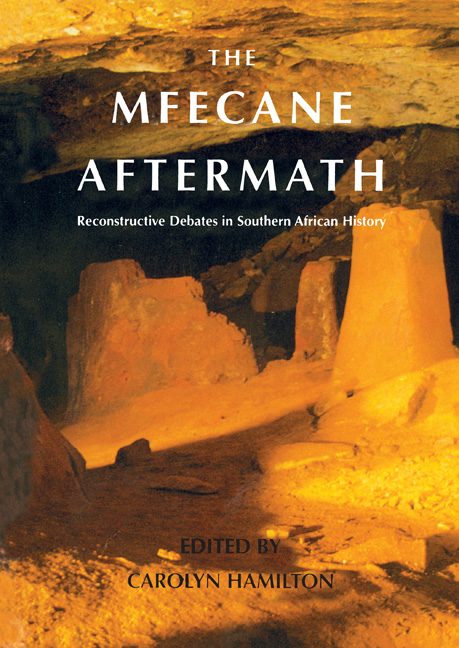Book contents
- Frontmatter
- Contents
- Maps
- Preface
- Acknowledgements
- Notes on Orthography and Names
- Contributors
- Introduction
- Part One Historiography and Methodology
- Part Two The South-Eastern Coastal Region
- Beyond the Concept of the ‘Zulu Explosion’ Comments on the Current Debate
- 5 Sources of Conflict in Southern Africa c. 1800-1830: The ‘Mfecane’ Reconsidered
- 6 Political Transformations in the Thukela-Mzimkhulu Region in the Late Eighteenth and Early Nineteenth Centuries
- 7 The Character and Objects of Chaka’: A Reconsideration of the Making of Shaka as Mfecane Motor
- 8 Matiwane's Road to Mbholompo: A Reprieve for the Mfecane?
- 9 Unmasking the Fingo: The War of 1835 Revisited
- 10 The Mfecane Survives its Critics
- Part Three The Interior
- Glossary
- Abbreviations
- Bibliographer's Note
- Bibliography
- Complete List of Papers Presented at the Colloquium
- Index
6 - Political Transformations in the Thukela-Mzimkhulu Region in the Late Eighteenth and Early Nineteenth Centuries
from Part Two - The South-Eastern Coastal Region
Published online by Cambridge University Press: 31 May 2019
- Frontmatter
- Contents
- Maps
- Preface
- Acknowledgements
- Notes on Orthography and Names
- Contributors
- Introduction
- Part One Historiography and Methodology
- Part Two The South-Eastern Coastal Region
- Beyond the Concept of the ‘Zulu Explosion’ Comments on the Current Debate
- 5 Sources of Conflict in Southern Africa c. 1800-1830: The ‘Mfecane’ Reconsidered
- 6 Political Transformations in the Thukela-Mzimkhulu Region in the Late Eighteenth and Early Nineteenth Centuries
- 7 The Character and Objects of Chaka’: A Reconsideration of the Making of Shaka as Mfecane Motor
- 8 Matiwane's Road to Mbholompo: A Reprieve for the Mfecane?
- 9 Unmasking the Fingo: The War of 1835 Revisited
- 10 The Mfecane Survives its Critics
- Part Three The Interior
- Glossary
- Abbreviations
- Bibliographer's Note
- Bibliography
- Complete List of Papers Presented at the Colloquium
- Index
Summary
This essay is the third in a series in which I seek to establish a new baseline for research into the history of the region between the Thukela and Mzimkhulu Rivers in the late eighteenth and early nineteenth centuries. In the first, I argue that the concept of the mfecane as it applies to this region is largely a product of colonial mythologising, and, in support of the critique of mfecane theory developed over the last few years by Julian Cobbing, that the concept is of no analytical value and needs to be abandoned by serious scholars. (By the mfecane I mean the notion that the series of wars and migrations which swept over much of south-eastern Africa in the 1820s was a result of the supposedly explosive expansion of the Zulu kingdom under Shaka.) In the second essay I argue that the standard account of the history of the Thukela-Mzimkhulu region before 1830, that which appears in A.T. Bryant's Olden Times in Zululand and Natal, is also based largely on colonial-made myths and cannot be regarded as reliable. In the present essay I go on to outline an empirical answer to the question of what to put in its place.
Bryant's account of the history of the Thukela-Mzimkhulu area is scattered through his synthesis of the history of the broader Natal-Zulu kingdom region. This is based on a model which was first clearly articulated in the writings of settler and missionary historians in colonial Natal in the 1850s and 1860s.
In terms of this schema, the region's history falls into four phases. In the first, the ancestors of the African population of Natal migrated into the region from further north in Africa. By Bryant's reckoning, this process had taken place during the period from about AD 1500 to 1700. The migrations were succeeded by a second phase, described by Bryant as a ‘golden age’, during which the people, divided into numerous small patriarchal ‘clans’, lived in relative peace and plenty. The third phase began dramatically in the 1810s with the sudden rise of the Zulu kingdom under the ‘tyrannical’ rule of Shaka and the ‘invasion’ of the region south of the Thukela by his ‘bloodthirsty’ armies. In the space of a few years, the region was ‘devastated’ and ‘depopulated’.
- Type
- Chapter
- Information
- Mfecane AftermathReconstructive Debates in Southern African History, pp. 163 - 182Publisher: Wits University PressPrint publication year: 1995

